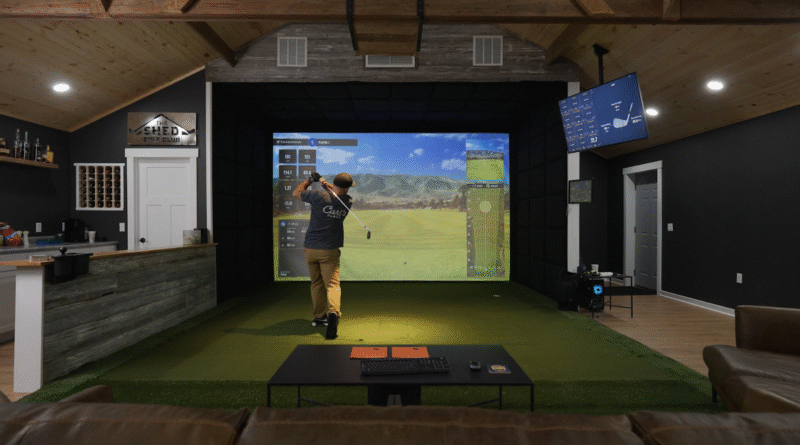The Tech-Driven Swing How Golf Simulators Are Powering Smarter Practice in 2025
Golf is no longer just about repetition and “feel.” In 2025, the smart golfer is leveraging cutting-edge technology to train more efficiently, track performance with precision, and accelerate improvement like never before. At the heart of this tech-powered revolution is the modern golf simulator — a tool that’s redefining what effective practice looks like.
As swing mechanics and digital innovation converge, today’s golfers are building their best swings with help from machines that never miss a detail.
Why Traditional Practice Alone Isn’t Enough Anymore?
1. Too Many Unknowns, Not Enough Feedback
Driving ranges give you space, but not much else. Without knowing why a shot sliced or carried short, you risk repeating the same mistakes.
That’s why more players now integrate technology that provides instant feedback, allowing them to identify and correct swing flaws in real time.
2. The Modern Golfer Demands Data
Today’s athletes — in all sports — are more data-focused than ever. Golfers are no exception.
They want to know their swing speed, attack angle, ball spin, and dispersion pattern — and they want to see that data evolve with every session.
How Golf Simulators Are Enabling Smarter Practice?
Real-Time Analytics That Drive Change
Every serious golfer knows that progress starts with measurement. A golf simulator tracks dozens of performance metrics in real time, turning each shot into a learning opportunity.
From club path to launch angle, every piece of data is a clue that guides improvement — and eliminates guesswork.
Personalized Feedback Loops
No two swings are the same, and smart systems know it.
Simulators now adapt to individual player tendencies, offering customized insights and training suggestions based on swing patterns, shot dispersion, and even practice consistency.
Visual Learning with High-Resolution Feedback
Beyond numbers, simulators offer dynamic visuals. Trajectories, spin animations, and swing replays give golfers the visual cues they need to refine their technique.
This combination of visual and numerical feedback accelerates muscle memory development and confidence.
Tech Features That Make 2025 Simulators Stand Out
High-Fidelity Tracking Systems
Using radar, infrared, or photometric cameras, modern simulators capture swing data with near-instantaneous precision.
This level of detail mirrors what tour players use — and it’s now available in consumer-friendly models for home use.
AI-Enhanced Coaching Modules
Many simulators now include AI-driven coaching that analyzes your swing over time and offers progressive drills.
These tools go beyond feedback, actively guiding your practice journey with recommendations based on your performance trends.
Integrated Video Analysis
Want to see exactly where your backswing went off track? Simulators now record swings and overlay them with analytics — letting you match feel with fact.
You can also compare swings side-by-side with previous sessions or professional models.
Benefits for Golfers at Every Level
Beginners Learn Faster and Smarter
New players can struggle to connect cause and effect in their swing.
Simulators bridge that gap by showing how setup, grip, or tempo adjustments change outcomes — dramatically speeding up the learning curve.
Intermediate Golfers Break Through Plateaus
For those stuck at the same handicap, simulator training provides the precision to identify subtle weaknesses and make targeted corrections.
It’s often the small adjustments, made consistently, that lead to big breakthroughs.
Advanced Players Stay Sharper Year-Round
From simulating tournament conditions to replicating course-specific shot scenarios, simulators help elite players maintain performance even in the offseason.
This ensures readiness when competition resumes — without ever stepping onto real turf.
The Future of Golf Practice Is Personalized, Measurable, and Digital
Smarter Training = Faster Results
When every swing provides insight, practice becomes strategic. Golfers can focus on impact factors that matter most — instead of wasting time on trial and error.
This results in faster improvement, greater confidence, and more enjoyment.
Data That Tracks Long-Term Progress
Most systems now store session history and trends, allowing you to monitor your development over weeks or months.
Whether you’re training alone or with a coach, this long-term view is essential for serious game improvement.
Final Thoughts
The future of golf belongs to those who practice with purpose — and that means embracing technology that delivers clarity, not just repetition. A golf simulator isn’t just a piece of equipment anymore; it’s a complete performance partner that empowers golfers to train smarter, not just harder. In 2025, the tech-driven swing isn’t a luxury — it’s the standard.

